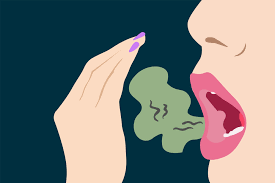Having bad breath can be painfully embarrassing and even put a damper on your social life or a job prospect. In this article, we’ll go over bad breath basics: what causes bad breath and how to get rid of bad breath once and for all!
Causes of Bad Breath
Technically speaking, bad breath is a biological reaction characterized by the release of volatile sulfur into the atmosphere. Bad breath may also contain hydrogen sulfide and methyl marcaptan.
So what causes bad breath? Most people have had it at least once so it makes sense that there are some common culprits. As it turns out, there are! To start, anyone with bad oral habits is likely to have bad breath. That means if you’re not brushing, flossing or seeing a dentist regularly, you should expect to experience bad breath soon enough. Keep in mind, however, that bad breath can also occur when food remains in your mouth or between your teeth even after brushing. Basically, these small bits of food begin to rot and start to smell.
There are other causes of bad breath, including:
Food — Certain foods, such as garlic, onions, cheeses and dairy, are common causes of bad breath. When you eat smelly foods, the digestive process releases strong gases that smell unpleasant; these gases can be released 24 hours after you’ve eaten that stinky item.
Tongue — The tongue harbors many bacteria that are some of the major causes of bad breath.
Medical Conditions — Certain medical conditions have been identified as causes of bad breath. Severe kidney failure or diabetic ketaoacidosis are two examples.
Large Dose of Vitamins — Ever take a handful of vitamins on an empty stomach? Not only can that cause a tummy ache, but it’s also one of the causes of bad breath.
Dry Mouth Syndrome (xerostomia) — A decrease in saliva production, known as dry mouth syndrome, can be caused by conditions such as anemia or diabetes. Taking over-the-counter medications and smoking cigarettes can also cause dry mouth; in turn, dry mouth can cause bad breath.
Cavities — A dental cavity is the result of tooth decay, which is an oral disease. When your teeth have decayed, it’s not uncommon for the decay to produce an odor — bad breath.
Dental Abscess — When a cavity is left untreated, a dental abscess can form around it. This pocket of pus contains bacteria that causes bad breath.
Gingivitis (or any form of gum disease) — At its extreme, gingivitis can lead to tooth loss. But more often, it’s one of the main causes of bleeding gums and bad breath.
Other causes of bad breath include undigested foods in the stomach and impacted teeth; the latter can trap food and debris in the areas where an impacted tooth is crowning (poking through the gums). The key to understanding what causes bad breath is remembering that if your mouth isn’t clean or healthy, it’s probably going to make your breath smell bad.
How to Get Rid of Bad Breath
Now that you know what causes bad breath, it’s time to go over what you’re probably most interested in: how to get rid of bad breath. The first thing to be aware of is that many of the so-called bad breath remedies like breath mints, gums or strips, offer only temporary help. Brushing twice a day, flossing daily and using mouthwash at bedtime is your ticket to a life free of bad breath (also known as halitosis). Proper oral hygiene habits can’t be stressed enough! Some even say that brushing after consuming sugar-rich foods — including pasta, bread, potatoes and milk — is a good idea.
If you’ve been searching for a magical solution on how to get rid of bad breath, now you know that the formula is simple: practice good oral hygiene and go for regular dental visits. A dentist can also offer more expert advice and tips to suit your lifestyle, so be sure to ask.

